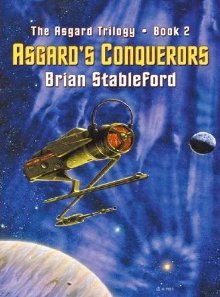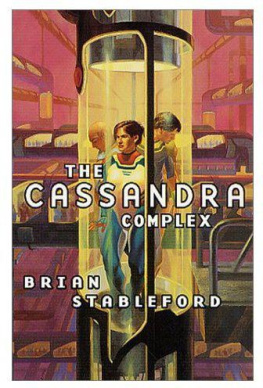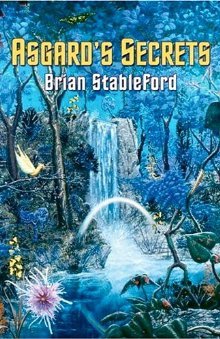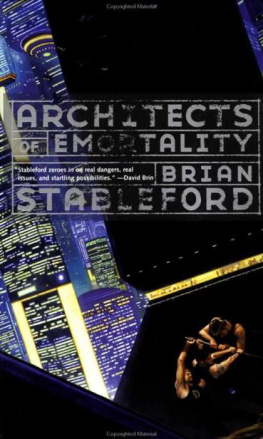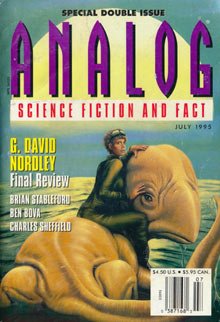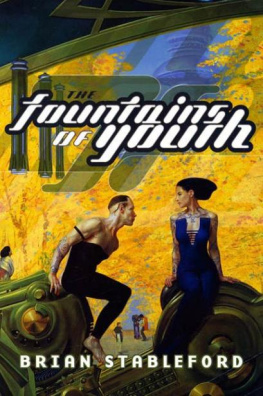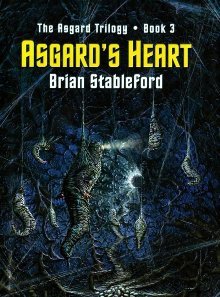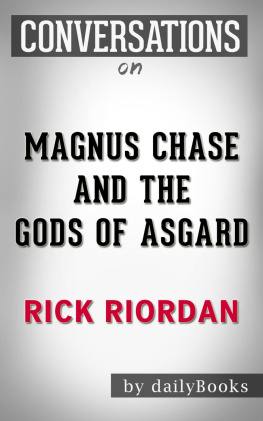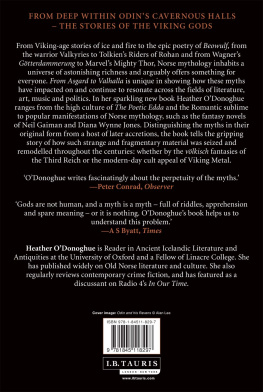Asgards Conquerors
by Brian Stableford
I sometimes have the disturbing impression that the universe is determined to force my life into the mould of an exemplary tale. I have done my best to resist, but I am beginning to believe that resistance is useless. I fear that fate has it in for me, and that destiny has me marked down for something big.
I will explain to you, if I may, how I arrived at this awful conclusion.
There is supposed to be an ancient Chinese curse which implies that the worst fate which could possibly befall a man is to live in interesting times. I had always been aware of this saying, but had never considered its logical corollaries, the first of which must surely be that one is similarly cursed if one is drawn, moth-to-flame fashion, to interesting places. So I, as a young man, was lured by my good friend Mickey Finn to cross half the known universe to the artificial macroworld which Earthmen had learned to call Asgard: the home of the technocratic gods.
Various members of the galactic community, representing as many as three hundred different humanoid species, had been digging around for technological artefacts in the topmost levels of Asgard for many years. The Co-ordinated Research Establishment organised the efforts of most of these good peopleguided and supervised by the Tetrax, who are very much the top dogs in the galactic community but I never joined it, preferring to be my own master and go wherever the mood took me into those cold and desolate spaces.
It was not I who made the breakthrough discovery that opened up the warmer and more interesting levels beneath those which had caught a dreadful chill in some unlucky cosmic accident. It was my fellow human Saul Lyndrach, who was quickly murdered by evil persons desirous of prising the secret out of him. It was then that I fell afoul of the second corollary of that ancient Chinese curse, which is that one can get into very deep trouble if one happens to become an interesting person. Through no fault of my own, I was suddenly very interesting indeed.
I was interesting to the gangsters who had murdered Saul because I happened to be the only person on Asgard who could read French, the language in which Saul had recorded his notes. I was also interesting to several members of Earths Star Force, who had come to Asgard fresh from concluding a genocidal war against the planet Salamandra. Their commanding officer, Star-Captain Susarma Lear, was convinced that a large man to whom Saul had generously given shelter, was actually a Salamandran android mysteriously equipped to take revenge on humankind; she also became convinced that I was the one man who could help her catch and kill this person.
To cut a long story short (you can read about it, if you wish, in the first volume of my memoirs) the android disappeared into the bowels of Asgard, with myself and the starship troopers in hot pursuit. We were tracked in our turn by an assorted rabble of vormyr and Spirellans, bent on mayhem.
And mayhem was what ensued.
When everything was finally sorted out, the star-captain and her merry men set off back to Earth, feeling smug about having completed their nasty mission, and I was left to sell the secret of the gateway into inner Asgard to the highest bidder.
I wasnt used to being rich. All my life Id lived on the margin, never having to worry about long-term ambitions because it was quite hard enough figuring out where next weeks food was going to come from. My lucky strike changed that, and suddenly I was precipitated into a premature mid-life crisis, faced with the awful prospect of making plans.
Asgard began to seem like a pricked balloon. Its mysteries were far from being solved, but the process had begun, and with hundreds of levels now open for exploration the contribution which might be made by any one man seemed pretty small. Even though I hadnt really got near the enigmatic centre of the world, I felt that my hour of glory had come and gone. I began to wonder what there was in the rest of the galaxy to attract the attentions of a nouveau riche recluse like myself. Inevitably, I began to think of home: the solar system; the asteroid belt; the microworlds; Mother Earth.
Id never actually been to Earth. Asgard, which was more than a thousand light years away from my birthplace in the belt, was the only planet-sized mass Id ever been on. It began to seem a little odd that Id come so far from home without ever bothering to visit the homeworld of my species, which was only a lousy couple of hundred million miles away from where Id started from. The more I thought about it, the more peculiar it seemed.
So I decided to make a pilgrimage to Earth.
Mistral, the ship in which Id come to Asgard, in the company of Mickey Finn, Helmut Belinski, and Jean Averaud, was still strung up to an umbilical, quietly trailing the Tetron satellite at the top of the skychain. She was evacuated and sealed. No dust, no decay, no wear and tear. Shed been Finns ship, really, though it had taken our combined fortunes to get her fitted out for the long trip to Asgard. Finn, Belinski, and Averaud had all been killed in an accident downstairs, on one of the trips when it was my turn to stay at home. Under our agreement, I inherited the ship. It was all I did inherit, along with a bill for Mickeys back taxes, which the Tetrax kindly forwarded to me.
That had been a bad time for meto be one of a group of four on a world mostly populated by aliens is one thing, to be a man alone is another. Id gotten used to it; in a way, Id gotten to like it. In the course of adjusting, Id pushed Mistral into some quiet corner of my consciousness, where she didnt intrude upon my thoughts. But shed always been there, waiting.
I used part of my small fortune to have her fitted out all over again. I had the fusion reactor overhauled and the space-stresser checked. I dont know the first thing about the tortuous physics of the frame force, which lets us play origami with raw space in order to wormhole ourselves around the universe, and I wanted to make quite sure that the ship would end up back in Sol-space when I pressed the right buttons. I bought new navigational software, and the best troubleshooting programmes I could find, just to make sure. Then, relishing the thought that I could splash out without pauperizing myself, I installed some brand new Tetron organicsan integrated thermosynthetic system that would do food, waste-disposal, atmosphere regulation, bioluminescence, and minor electrics with pure organic technology; not an adapted organism in it. When wed flown out, wed had to make do with bacterial soup and adapted fungi. The food had been unbearable, the stink disgusting.
When it was all done, and my ship was rigged up for first- class service, I trundled up the skychain, and I said au revoir to dear old Asgard. I wasnt sure that Id ever be back.
I wasnt sure of anything, much.
Starships are very fast. They make light seem like viscous treacle oozing across a flat tabletop. But galactic distances are not small; in fact, they are unimaginably huge. So the ships flight back to Earth was no mere ferry-crossing. It took months, and it became very boring.
I had text-discs and I had sound-discs. I had a centrifuge to put weight on me, and various gadgets for keeping various bits of me fighting fit. They kept me occupied for a while, but in the end I was forced to seek some new distraction, some pleasure whose delights I had never tasted before.
That was when I conceived the plan of writing the memoirs to which I referred, and immediately reached for my tape recorder. I wont say that it was an entirely joyful experience inscribing it all, because I am not a literary man, and sometimes found composition hard work. On the other hand, I am sure that my reconstructed dialogue sounds a good deal slicker than what was actually said at the time; poetic license can be fun! I had no intention of publishing what I had recordednot immediately, anyhowbecause there was some very sensitive information in there regarding the real fate of the android which Susarma Lear thought she had destroyed, but I took a certain satisfaction in setting the record straight.

